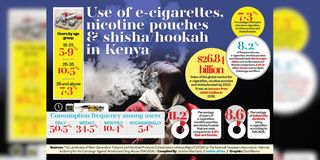
In 2018, Mamito (as she prefers to be identified) got caught up in the whirlwind of smoking.
Then a 15-year-old girl born and raised in Mathare, an informal settlement in Nairobi, she recalls the pressure to “fit in” and gain a sense of belonging among her peers.
At the time, she was in Form Three and part of a group of about 10 girls who frequently socialised with boys addicted to cigarettes.
“We used to hang out at a base, and one boy would buy cigarettes and say, ‘Give everyone,’” she shares. “You couldn’t refuse to puff; they’d say you’re not one of them and uko na ufala (you’re foolish). So I just went along to make them happy and feel accepted.”
She became addicted to cigarettes and often skipped school to spend time at the base, eventually dropping out altogether. Two years later, she got married. Her husband, however, did not smoke and tried to persuade her to stop.
“He really didn’t like the smell at home and tried to talk me out of it, but I was already too deep into it,” she says. “He left three months later. I was already pregnant by then.”
His departure was a turning point.
“He was a good man. I felt terrible and blamed myself for the collapse of my marriage. That’s when I decided to quit smoking and turn my life around.”
Mamito stopped smoking in 2022. Today, she sells porridge to support herself and her child.
While her husband could not stand the smell of tobacco, a new trend in substance use is emerging, one that’s harder to detect.
Vaping

Currently, there is no data available on vaping prevalence among men and women in Kenya.
E-cigarettes, commonly known as vapes, produce a vapour that smells like cologne rather than smoke. However, the 'e-juice' used in these devices typically contains nicotine, a highly addictive substance derived from tobacco.
Aisha, a fourth-year university student, says a friend introduced her to vaping in 2022.
“It felt classy and nice,” she says.
“It looks like a pen and is charged with electricity. It costs around Sh1,000 and comes in different flavours.”

While some women may be using pungent tobacco products and others less detectable ones, the increasing involvement of women in substance abuse is a growing concern.
Currently, there is no data available on vaping prevalence among men and women in Kenya, a gap highlighted by nominated Senator Catherine Mumma, who has sponsored the Tobacco Control (Amendment) Bill, 2024, currently set for its second reading.
“Vaping has been in Kenya for about eight years and remains unregulated, making it difficult to track usage trends,” she says.
However, for conventional tobacco use, there are troubling gender dynamics.
According to the Tobacco Control Data Initiative under the Ministry of Health, the prevalence of cigarette smoking among men aged 15–49 dropped from 15.8 per cent in 2014 to 9.3 per cent in 2022.

In contrast, prevalence among women in the same age group increased from 0.4 per cent to 0.7 per cent during the same period.
Rev Wangai Gachoka, the Mombasa County Coordinator at the National Authority for the Campaign Against Alcohol and Drug Abuse (Nacada), attributes the rise in cigarette use among young women to early exposure, often beginning in secondary school as was the case for Mamito.
“Vaping is more popular among women than men because it smells like cologne,” he says. “You smell like chocolate, strawberry, or banana, but the truth is, vapes can contain more harmful chemicals than tobacco cigarettes. Sometimes, they’re laced with as many as 19 different substances, including cocaine and bhang (cannabis).”
Ms Mumma’s proposed law seeks to tighten regulations on the production, sale, advertisement, and use of nicotine products, both natural (tobacco) and synthetic, including nicotine pouches and electronic nicotine delivery systems commonly referred to as vapes.
The urgency is echoed by the Ministry of Health, which recently suspended all licences for the manufacture, importation, sale, and promotion of nicotine products.
This followed a global call by the World Health Organization on May 31 during World No Tobacco Day that urged governments to ban all flavourings in tobacco and nicotine products, including cigarettes, pouches, hookahs, and e-cigarettes, to protect youth from addiction and disease.






